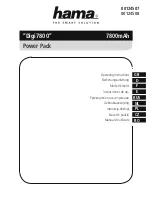
10.
UPGRADING TO HIGHER CAPACITY – INSTALLING ADDITIONAL MODULE(S)
Additional optional module(s) (
Model No. SEC-2012MPSB-220
) can be added to upgrade the out-
put current capacity of SEC-40BRM / SEC-60BRM / SEC-80BRM-220 by steps of 20A to a maxi-
mum of 100A. For example, an SEC-40BRM-220 (40 A, with 2 modules) can be upgraded to SEC-
60BRM-220 (60A) by adding 1 more module or to SEC-80BRM-220 (80A) by adding 2 more mod-
ules or to SEC-100BRM-220 (100 A) by adding 3 more modules.
The optional module
SEC-2012MPSB
-220 comes with an LED and LED holder. It’s output voltage
is pre-set at 14.2 Volts
The procedure to install additional module(s) is as follows :
1.
Remove the top cover plate by unscrewing the 10 screws
2.
Each module sits on 6 stand-offs under the holes
S1
to
S6
(Fig.1). Additional module(s) are to be installed in
the vacant space(s) adjacent to the right of the existing module. Remove the screws from the 6 stand-offs
for the adjacent vacant space for the module.
3.
Place the module on the stand-offs with the
L
an
N
terminals (Fig.1) towards the front panel. Align the holes
and fix the module with the 6 screws.
WARNING! Please ensure that screws S5 and S6 are very tight as
the pads under these two screws connect the output of the module(s) to the DC bus bar underneath.
A loose connection under these screws will result in sparking , overheating and consequent damage
to the module
4.
Each module has independent AC power input wires. Locate unused pair of AC input wires. (Black and
white with insulated female quick connect terminals). The black wire is required to be connected to the male
tab terminal marked
L
(Fig.1) and white wire is required to be connected to the male tab terminal marked
N
(Fig.1).
DO NOT CONNECT THESE WIRES TILL STEP 8 BELOW.
5.
Terminal marked LED2 (Fig.1) is used for the front panel LED under “PSM Status (1 to 5)” and terminal
marked LED1 (Fig.1) is used for remote indication through the D-Sub connector. The PSM status output
signal from connector LED1 is fed to the associated opto-coupler on the small opto-coupler PCB (Printed
Circuit Board) & from there it is fed to the D-Sub connector. Connection to the opto-coupler PCB and on-
ward to the D-Sub connector for remote indication is made using color coded pair of wires for each of the 5
modules (Please see the colour code for PSM 1 to 5 under
REMOTE MONITORING AND INDICATION
on
Page 5). An LED holder and a green LED with wire and female quick connect terminal are provided with the
new module for connecting to the front panel. The vacant hole(s) for the front panel LEDs are closed with
plastic plug(s). Remove the plastic plug from the vacant hole for the LED under the existing bottom most
LED. Insert the LED holder in this hole from the outside. Insert the green LED from the inside and push it till
it locks. Connect the female quick connect terminal of the LED to the male quick connect terminal marked
LED2 (Fig.1). If remote indication is also required, then connect the female quick connect terminal of the
corresponding colour coded wire for the remote indication connection to the male quick connect terminal
marked LED1 (Fig.1)
6.
All the connected modules operate under forced current share control through a daisy chained
SHARE BUS
formed by interconnecting each module through the male quick connect terminal marked
JUMP1
(Fig.1 &
2). A wire with 5 female quick connect terminals is provided for the above connection. Locate the unused
female quick connect terminal(s) of this wire and connect it to the male quick connect terminal marked
JUMP1
(Fig.1)
7.
Use cable ties to secure all loose wiring
8.
As explained under “OUTPUT VOLTAGE ADJUSTMENT” on pages 8 and 9, the output voltage at the indi-
vidual modules (Measured at points S5 & S6 of the module as shown at Fig. 1 on page 17) is required to be
set exactly at the same voltage for proper current share control. Each module is factory preset at a voltage
of 14.2V with the help of potentiometer VR1. Although the optional module SEC-2012MPSB is factory preset
at 14.2V, it may differ slightly due to tolerance. It is, therefore, necessary to ensure that the voltage of all the
individual paralleled modules {the existing modules and the additional optional module(s)} is set exactly at
14.2V. For this, follow instructions given under “
Procedure
” on page 9.
9.
Replace the top cover. Power on the unit and confirm that the “
PSM Status
” LEDs of all the installed mod-
ules are lighted.










































